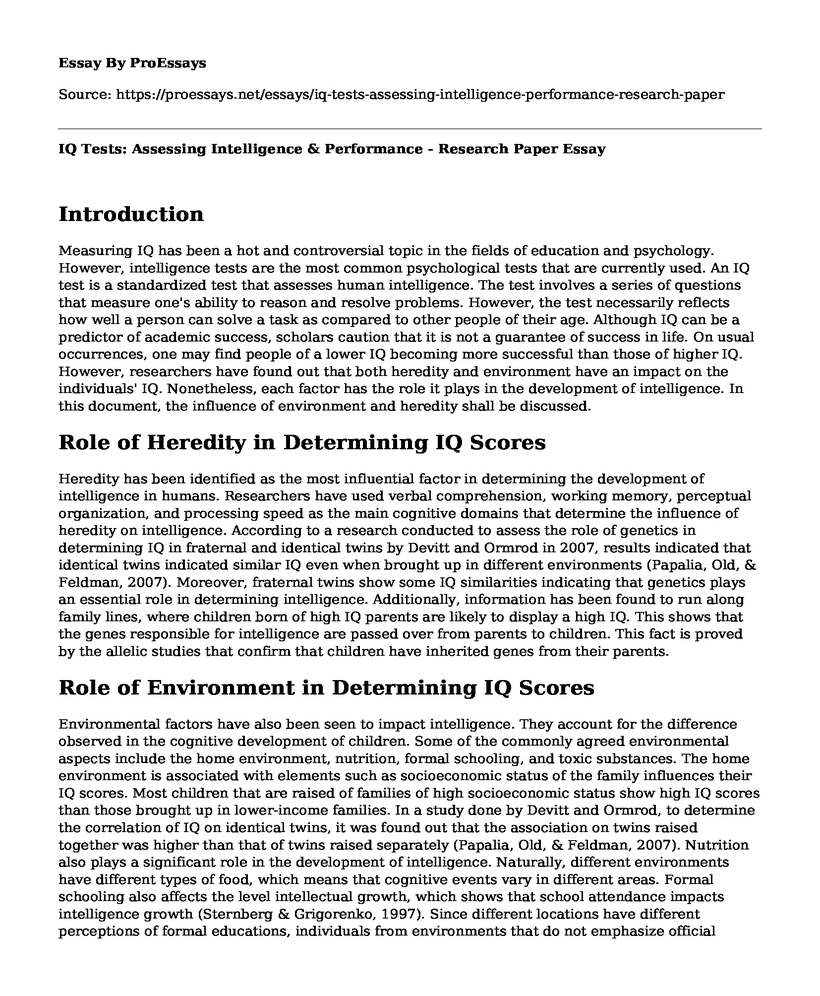Introduction
Measuring IQ has been a hot and controversial topic in the fields of education and psychology. However, intelligence tests are the most common psychological tests that are currently used. An IQ test is a standardized test that assesses human intelligence. The test involves a series of questions that measure one's ability to reason and resolve problems. However, the test necessarily reflects how well a person can solve a task as compared to other people of their age. Although IQ can be a predictor of academic success, scholars caution that it is not a guarantee of success in life. On usual occurrences, one may find people of a lower IQ becoming more successful than those of higher IQ. However, researchers have found out that both heredity and environment have an impact on the individuals' IQ. Nonetheless, each factor has the role it plays in the development of intelligence. In this document, the influence of environment and heredity shall be discussed.
Role of Heredity in Determining IQ Scores
Heredity has been identified as the most influential factor in determining the development of intelligence in humans. Researchers have used verbal comprehension, working memory, perceptual organization, and processing speed as the main cognitive domains that determine the influence of heredity on intelligence. According to a research conducted to assess the role of genetics in determining IQ in fraternal and identical twins by Devitt and Ormrod in 2007, results indicated that identical twins indicated similar IQ even when brought up in different environments (Papalia, Old, & Feldman, 2007). Moreover, fraternal twins show some IQ similarities indicating that genetics plays an essential role in determining intelligence. Additionally, information has been found to run along family lines, where children born of high IQ parents are likely to display a high IQ. This shows that the genes responsible for intelligence are passed over from parents to children. This fact is proved by the allelic studies that confirm that children have inherited genes from their parents.
Role of Environment in Determining IQ Scores
Environmental factors have also been seen to impact intelligence. They account for the difference observed in the cognitive development of children. Some of the commonly agreed environmental aspects include the home environment, nutrition, formal schooling, and toxic substances. The home environment is associated with elements such as socioeconomic status of the family influences their IQ scores. Most children that are raised of families of high socioeconomic status show high IQ scores than those brought up in lower-income families. In a study done by Devitt and Ormrod, to determine the correlation of IQ on identical twins, it was found out that the association on twins raised together was higher than that of twins raised separately (Papalia, Old, & Feldman, 2007). Nutrition also plays a significant role in the development of intelligence. Naturally, different environments have different types of food, which means that cognitive events vary in different areas. Formal schooling also affects the level intellectual growth, which shows that school attendance impacts intelligence growth (Sternberg & Grigorenko, 1997). Since different locations have different perceptions of formal educations, individuals from environments that do not emphasize official education show lower IQ scores as compared to settings that emphasize formal education.
Conclusion
In conclusion, IQ scores are influenced by both heredity and environment. Allelic studies show that parents can pass the genes for intelligence to their children, which indicates that heredity affects the IQ scores. Climate, on the other hand, determines the home setting, formal education, and nutrition, which directly impacts cognitive development, and eventually IQ score.
References
Papalia, D. E., Olds, S. W., & Feldman, R. D. (2007). Human development. McGraw-Hill.
Sternberg, R. J., & Grigorenko, E. (Eds.). (1997). Intelligence, heredity and environment. Cambridge University Press.
Cite this page
IQ Tests: Assessing Intelligence & Performance - Research Paper. (2023, Feb 27). Retrieved from https://proessays.net/essays/iq-tests-assessing-intelligence-performance-research-paper
If you are the original author of this essay and no longer wish to have it published on the ProEssays website, please click below to request its removal:
- Errors and the First Language
- Intertwining Autobiographical Events in A Farewell to Arms
- Essay Sample On Abnormal Psych: Unusual Behaviour & Mental Health
- Essay Example on Unlock Your Potential: Self-Determination and You
- Essay on Mental Health Disorders in Kids and Adults: What You Need to Know
- Essay Example on the Science of Aging: Exploring Gerontology and its Effects
- Essay Sample on Criminal Justice Info Literacy: Recognizing, Evaluating, Locating & Managing Sources







